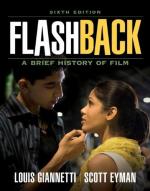
|
| Name: _________________________ | Period: ___________________ |
This test consists of 15 multiple choice questions and 5 short answer questions.
Multiple Choice Questions
1. Upon whose model of mass production did the Hollywood studio system manufacture films in the Golden Age?
(a) F.W. Murnau.
(b) Eli Whitney.
(c) Orson Welles.
(d) Thomas Edison.
2. As the studios bowed to pressure from outside groups during the Golden Age, what was one of the effects seen on the gangster movies?
(a) The films became morality tales.
(b) Gangster films were banned.
(c) Women were not allowed behind the camera.
(d) Violence was removed.
3. Which director became renowned for his use of long takes to evoke a darker mood?
(a) Lev Kuleshov.
(b) F.W. Murnau.
(c) Enst Lubitsch.
(d) Fritz Lang.
4. What did Meissonier's conversion of Muybridge's photographs create?
(a) A sound machine.
(b) An illusion of movement.
(c) A projector.
(d) A live-action special effects device.
5. How large was the tax on foreign film earning in Britain after World War II?
(a) 65%.
(b) 45%.
(c) 75%.
(d) 55%.
6. What sort of performers were ideal candidates for comedy shorts in the 1920s?
(a) Dancers.
(b) Vaudeville.
(c) Singers.
(d) Shakespearean.
7. What technological breakthrough hurt the film industry in America?
(a) Television.
(b) Radio.
(c) Telegraph.
(d) Telephone.
8. What was one reason comedy shorts became so popular in the 1920s?
(a) The stories were presented in serial format.
(b) The audiences did not need to follow a plot.
(c) The tabloid era had begun.
(d) The actors all had scandalous lives.
9. Which of the following was not one of the the Big Five studios in the Golden Age of the Studio?
(a) RKO.
(b) Universal.
(c) Paramount.
(d) Warner Bros.
10. What was the standard amount of time devoted to creating a picture during David Wark Griffith's development of film?
(a) One month.
(b) One year.
(c) One day.
(d) One week.
11. Which company became renowned for their animation in the early years of World War II?
(a) Warner Bros.
(b) RKO.
(c) MGM.
(d) Disney.
12. When Hitler came to power, what did Europe lose in their film industry?
(a) Freedom of movement to find new locations.
(b) Funding.
(c) Jewish artists.
(d) Freedom of speech.
13. What was created in order to satisfy the demands of the Catholic Church (among others) in the 1930s?
(a) Production Code.
(b) MPAA.
(c) Hayes Code.
(d) Decency Council.
14. From what year was a diary entry discovered as having discussed the beginnings of projections?
(a) 1811.
(b) 1718.
(c) 1532.
(d) 1666.
15. What studio did William Fox and Carl Laemmle eventually form?
(a) Fox.
(b) MGM.
(c) Universal.
(d) Paramount.
Short Answer Questions
1. For what reason did many great artists leave Europe for America in the 1930s?
2. What group was formed in 1908 with the intention to further develop the Kinetoscope technology?
3. What aspect of the newly-heard dialogue in the Golden Age made audiences uneasy?
4. In what style did the French produce their films?
5. When American films began to include sound (particularly dialogue), what sound effect uncomfortably highlighted the violence in most movies?
|
This section contains 473 words (approx. 2 pages at 300 words per page) |

|




